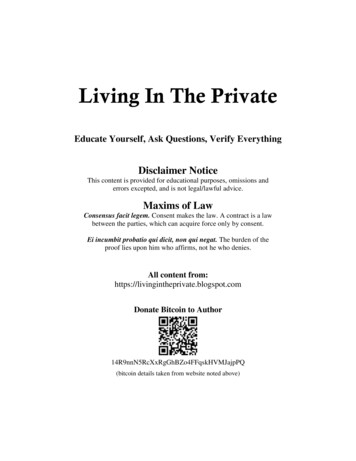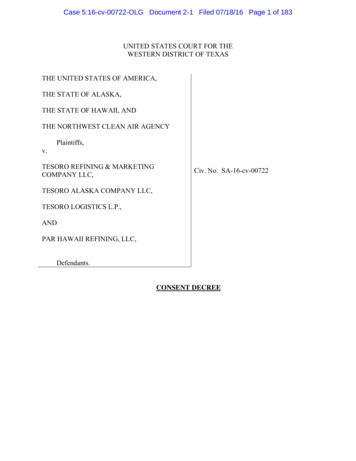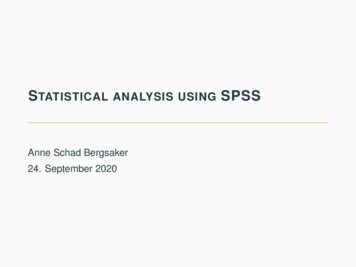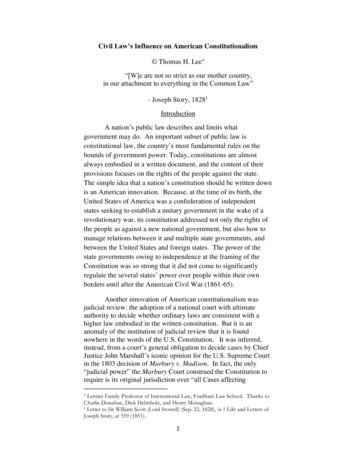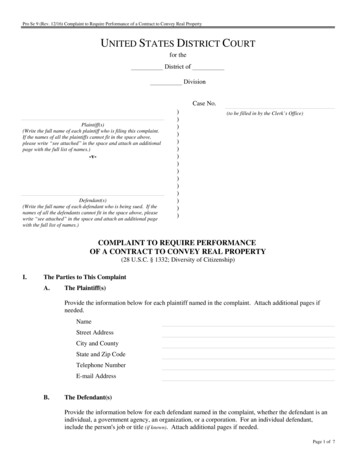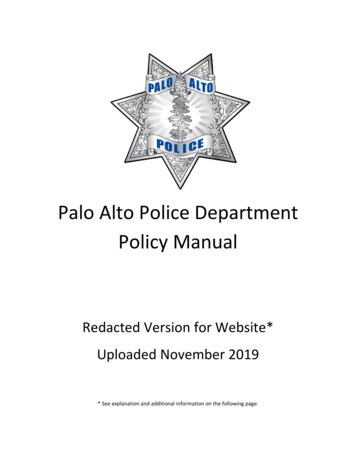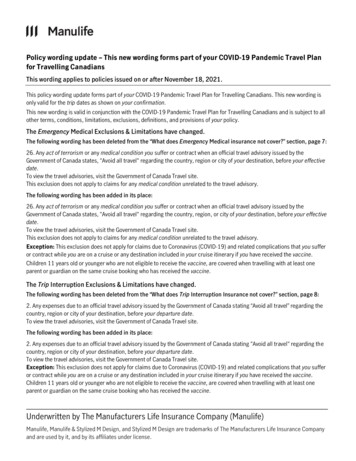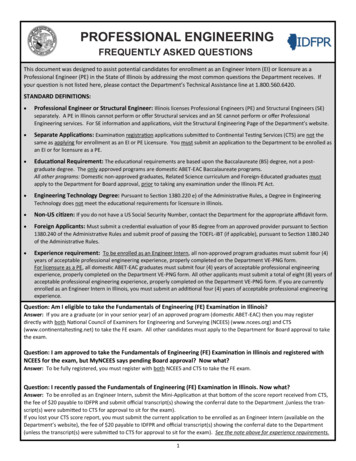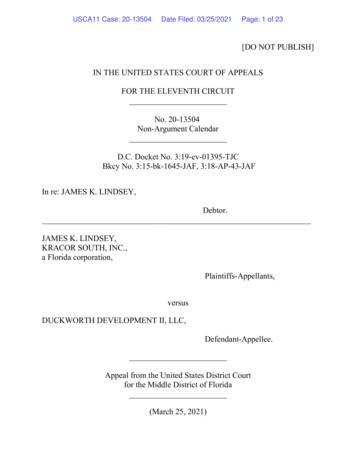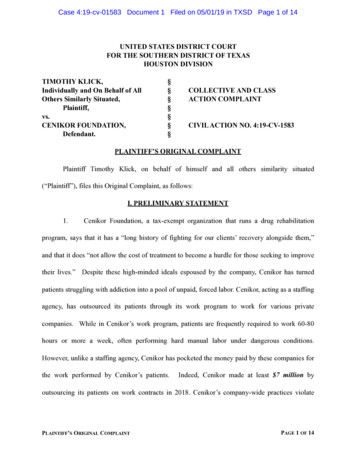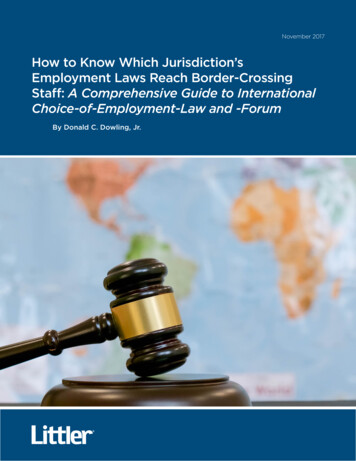
Transcription
November 2017How to Know Which Jurisdiction’sEmployment Laws Reach Border-CrossingStaff: A Comprehensive Guide to InternationalChoice-of-Employment-Law and -ForumBy Donald C. Dowling, Jr.littler.com Littler Mendelson, P.C.
For the vast majority of employment relationships around the world, choice-of-law analysis is anon-issue that we rarely ever think about. Obviously (for example), a Paris-resident baker workinglocally for a French bakery is protected only by French employment law. A Buenos Aires-residentbanker working locally for an Argentine bank is protected only by Argentine employment law. Andso on. Choice-of-law (also so-called “conflict of laws”) analysis in plain-vanilla domestic employmentscenarios is so simple, so intuitive and so uncontroversial that it almost never comes up.But choice-of-employment-law becomes a hot issue—sometimes fiercely contested in expensivelitigation—in cross-border employment relationships, for example: international business travelers (employed in one country, temporarily working in another) expatriates and international “secondees” foreign hires (recruited in one country to work in another) international commuters (living in one country but working in another) foreign correspondents and overseas teleworkers (working in one country for an employerin another) employees with international territories (working in several countries at the same time) mobile or “peripatetic” employees (with no fixed place of employment—sailors, flight crews,international tour guides and the like) international co-/dual-/joint-employees (staff split-payrolled by, or simultaneously employedby, two employer affiliates in different countries) former employees accused of having breached a post-term restrictive covenant in ajurisdiction other than the final place of employmentThese scenarios implicate employment across borders, and surely the most common question incross-border employment law is: Which country’s employment laws reach border-crossing staff? Plusthere are the follow-on questions: Which country’s courts can adjudicate disputes between bordercrossing staff and their employers? And: To what extent is a choice-of-law provision enforceable whenit appears in an employment agreement, expatriate assignment letter, employee benefits program orcompensation plan?These three questions get asked—or, certainly, they should get asked—when an employer recruits,hires, employs, rewards and dismisses an employee in any cross-border employment arrangement.These questions get asked when a multinational employer structures a mobile job, an expatriateposting, an overseas “secondment” or even a long international business trip. These questions getasked when a multinational drafts cross-border employment policies and international benefitsor equity plans. These questions get asked as to restrictive covenants and employee intellectualproperty assignments with cross-border territorial scope. Indeed, these questions even come upwhen an organization contracts with an overseas independent contractor (because of the risk ofmisclassification as a de facto employee). And these questions become vital when an employerneeds to dismiss border-crossing staff, because these questions implicate “forum shopping”—andit has been said that employees who can “forum shop” wield “powerful ammunition in negotiationsover compensation.”1The full answer to these three questions is, at the same time, both simple and complex. A simplegeneral rule applies most of the time, but that general rule is subject to nuances, refinements,strategies, exceptions and purported exceptions. To lay out the full answer to these questionsrequires a rather detailed discussion analyzing three topics: (1) the general rule on the territorialityof employment protection laws, (2) nuances and refinements to the territoriality rule, and (3)contractual choice-of-law and choice-of-forum provisions and the territoriality rule. We addressall three topics here.1P. Frost & A. Harrison, “Company Uniform,” The Lawyer (London), Dec. 11, 2006 at 21.November 20172
Part 1: The General Rule on the Territoriality of EmploymentProtection LawsThe U.S. Army used to run an English Channel ship repair center in Hampshire, England. Backin 2006, “for strategic reasons” the Army closed the shipyard.2 But in shutting it down, the Armyignored an English labor law that prohibits layoffs of 20 or more workers within 90 days unless theemployer first “consult[s]” or negotiates “about the dismissals” with the employees’ representatives—even if they are not unionized.3 An English accountant called Mrs. Nolan sued the Army for laying heroff without first consulting, but the Army fought back in court, arguing English labor law does notreach an overseas U.S. Army post engaged in activities that are jure imperii and are not jure gestionis(sovereign immunity concepts)—and besides (the Army argued), in the international public-sectorcontext, UK and European Union labor laws are ultra vires (lacking authority).4The case adjudicating these rarified legal defenses dragged on for nine years, going all the wayup to the UK Supreme Court. In 2015, the Supreme Court issued a 45-page opinion that upheldfor Mrs. Nolan the profoundly simple rule that local (here, English) labor law applies locally (here,in England) to protect employees who work locally (here, Mrs. Nolan).5 The UK Supreme Court’sNolan decision is just one of thousands of employment cases around the world reinforcing the basic,obvious, intuitive and uncontroversial general rule that underlies all choice-of-employment-law:Employment protection laws are territorial to the place of employment. That is, the employmentprotection laws of the place where you work protect you. It took the UK courts nine years to affirmthat even Latin-denominated concepts as esoteric as jure imperii, jure gestionis and ultra vires do notoverride such a fundamental principle.The corollary or inverse or outbound prong of this “territoriality” rule is that employmentprotection laws of all jurisdictions other than the current place of employment—even the place ofan employee’s citizenship, the place of hire or (as in the Nolan case) the place of the employer’sheadquarters—generally do not reach into overseas jurisdictions (unless expressly drawn in by anagreement between the parties). That is, if you work in jurisdiction X, then not only do jurisdiction X’semployment-protection laws protect you, but jurisdiction Y’s employment-protection laws do not.In short, when contemplating which jurisdiction’s laws apply in a cross-border employmentscenario, always begin with this basic, presumptive “territoriality” rule. Always assume, as a startingpoint, that employment protection laws are territorial to the place where the employee now works.Not only does the law of the place of employment control, but (per the rule’s corollary, inverse oroutbound prong), employment laws of other jurisdictions do not also apply. And remember that thisrule applies to all employees, vulnerable low-wage laborers as well as high-compensated executives.This said, the territoriality rule of employment protection law is just a strong general rule orpresumption that applies most of the time—there are very rare deviations where a court flatlyholds the general rule does not apply.6 In addition, though, there are lots of nuances, refinements,strategies, partial exceptions and purported exceptions to the general rule, which we discuss indetail here. Because our discussion here grows out of the fundamental rule of the territoriality ofemployment protection laws, we begin by explicating the core rule itself, addressing: (A) examples ofhow the territoriality rule works—including United States examples and expatriate examples,(B) public policy behind the rule, and (C) the “employment protection” law concept.23456USA v. Nolan, [2015] UKSC 63.That British labor law is the UK Trade Union and Labour Relations (Consolidation) Act 1992, as amended in 1995, § 188. (Ifthe employees are not unionized and so do not have any standing team of worker representatives, English law requiresthey be allowed to designate representatives for purposes of consulting over the lay-off.)Nolan, supra note 2 at ¶ 12.Nolan, supra note 2.E.g., Sabd-Krutz v. Quad Electronics, US DC ED Cal. case no 2:15-cv-0021-MCE-AC, op. of July 7, 2015 (non-competeenforceable under foreign state’s law where employee was hired out-of-state, does “99%” of work out-of-state and movedin-state only for personal convenience).November 20173
A. Examples of how the territoriality rule worksAs an example of how the general rule on territoriality of employment protection laws works,imagine a hypothetical 14-year-old legally employed for a while in her home country, who then movesto a new country with a minimum child labor age of 16. Even if a guardian consents to applying thischild’s home-country employment law, obviously this girl is too young to work in the new jurisdiction.As another example, imagine an employer with staff in a state that imposes a high minimum wage.This employer obviously cannot legally pay personnel below the state minimum—even if it can lurein workers from another state with a lower minimum wage who agree, contractually, to apply homestate law. Yet another example is health and safety law: No jurisdiction will compromise its workplacehealth and safety laws, even for an employee inpatriate from another jurisdiction with laxer health/safety laws who is willing to apply home-country rule. United States examples. When U.S. employers branch out overseas, they often want to exportemployer-friendly U.S.-style employment-at-will principles (at least to U.S. expats relocatingabroad). U.S. organizations often chafe at the general rule on the territoriality of employmentprotection laws—Americans often see the rule as heavy-handed and they often speak of it as aquirk of hyper-protective foreign regimes hostile to employment-at-will. But a frustrated U.S.employer should at least acknowledge: We impose this very rule ourselves.The employment protection laws of a U.S. place of employment almost always apply inthe face of less-protective regulations from some other jurisdiction, even if the parties hadcontractually selected foreign law. In the words of the U.S. Court of Appeals for the NinthCircuit, laws that “seek to protect.workers” are “protective legislation” constituting publicpolicy so deeply “fundamental” that employers and employees cannot opt out of or contractaround them.7 Under the framework of the American Restatement (Second) of Conflictof Laws § 187(2)(b), an employee’s current place of employment has “a materially greaterinterest” in applying the “fundamental policy” of its employment protection laws thandoes a foreign jurisdiction—even a jurisdiction that an employer and employee may havecontractually selected.Imagine hypothetically a Pakistani technology company transfers an entry-level Karachiprogrammer (Pakistani citizen with U.S. work visa) to its branch in Palo Alto. Imagine theprogrammer signs a contract calling for the law of her and her employer’s home country—Pakistan. Pakistan obviously has a strong nexus to this particular employment relationship, sounder commercial principles, this choice-of-law clause would be presumptively enforceable.8But imagine that after the programmer’s place of employment shifts to California, shecontinues to earn a Pakistani wage less than the U.S. minimum, she gets sexually harassed,she suffers an injury because of a workplace safety violation and she gets disciplined forusing social media to criticize her boss. The Pakistani programmer might file claims with theU.S. Department of Labor, the EEOC, OSHA, the NLRB and California state agencies, and shemight file a California state workers’ compensation claim. In defending against these charges,the employer could invoke the affirmative defense of the contractual choice-of-Pakistan-lawclause. But few American lawyers would bet on that defense prevailing. America’s federaland California’s state public policy void most prior waivers of employment protection laws—including waivers in the guise of foreign choice-of-law clauses.9 Just as an agreement to workfor less than minimum wage would be void under the U.S. Fair Labor Standards Act, andjust as an advance waiver of workplace safety law would be void under OSHA, a contractualselection of Pakistani wage law will be void if Pakistan’s minimum wage is below the FLSAminimum, and a contractual selection of Pakistan’s workplace safety law will be void ifPakistani health and safety standards are below U.S. OSHA standards. Any court holdingotherwise would push this California-based employee out of the safety net of American andCalifornian employment protection laws.789Ruiz v. Affinity Logistics, 667 F. 3d 1318 (9th Cir. 2012), later proceeding 2014 U.S. App. LEXIS 11123 (9th Cir.).Restatement (Second) of Conflict of Laws § 187(2)(a).Ruiz, supra note 7.November 20174
Expatriate examples. Of course, the general rule on the “territoriality” of employmentprotection laws often arises in—and usually applies to—the expatriate context. A businessexpatriate is an employee originally hired in (and originally working for) an employer in ahome country who later moved to, and who now works for that same employer (or an affiliate)in, a new host country. The territoriality rule dictates that the employment protection laws ofan expatriate’s new host country (the new place of employment) protect the expatriate, evenwhere both the expatriate and the employer are from the same foreign home country. Forexample, the French Supreme Court has held that New York employment law, not French law,covers French citizens who work in New York even for French-owned employers.10 As anotherexample, the Ontario Superior Court of Justice rejected an employment claim invokingCanadian law of a Canada-hired Canadian who got transferred to New York and then fired.11The rule in these cases becomes particularly significant when an American employee leavesthe United States, because of America’s employment-at-will doctrine. As mentioned, theterritoriality rule dictates that an American whose place of employment shifts abroad almostalways steps out of employment-at-will and into the safety net of host country employmentprotections—the “indefinite employment” regime of vested rights, caps on hours, mandatoryvacation, severance pay and termination protections.B. Public policy behind the ruleThe general rule on the territoriality of employment law emerges from a strong underlying publicpolicy: Employment protection laws tend to be strands in the legal safety net that each jurisdictionerects to protect people who work inside its territorial borders. If some jurisdiction’s employmentsafety net fails to catch certain people who work locally—for example, if the employment protectionlaws of some country exempted foreign citizens working in-country (say, immigrants, “inpatriates,”or those working for foreign-headquartered organizations), then employers might withhold thejurisdiction’s minimum labor protections under its “mandatory rules.” From a public policy point ofview, the issue becomes exploitation: Just because some worker happens to be an immigrant, aninpatriate or an employee of a foreign organization should not give the employer an excuse to payless than local minimum wage, to flout local health and safety regulations or to violate any other localemployment protection law, be it a discrimination law, a restrictive covenant law, a severance pay lawor any other employment law.And the corollary of the general rule on the territoriality of employment law (the inverse oroutbound prong) also emerges from a strong underlying public policy: Jurisdictions are poorlypositioned to police compliance overseas with their domestic workplace regulations. And underthe principle of sovereignty, each jurisdiction has the primary and keenest interest in regulatingworkplaces on its own soil, protecting workers working on its own soil. A jurisdiction’s employeeprotection laws generally should not reach outside its territorial boundaries.C. The “employment protection” law conceptUnder this territoriality rule, employment protection laws of a jurisdiction are mandatory rulesapplicable locally by force of public policy. Employment protection laws tend to include most all ofa jurisdiction’s rules regulating the employment relationship—its laws regulating, for example, payrate, payroll, overtime, workplace health/safety, child labor, payroll contributions, mandatory benefits,caps on hours, rest periods, vacation/holidays, labor unions/collective representation, discrimination/harassment/bullying/“moral” abuse, employee-versus-contractor classification, and restrictivecovenants/non-competes/trade secrets/employee intellectual property. In addition, employmentprotection laws also include the full suite of laws that regulate dismissals—laws on “good cause”for firing, dismissal procedures, pre-dismissal notice periods, mandatory retirement, severance payand severance releases. In the employment context, mandatory rules also include data protection(privacy) laws, which are not even employment laws.1011French Sup.Ct. dec. 10-28.563 of Feb. 2012 (many French choice-of-employment-law cases involve so-called “Frenchemployment contracts,” which—as we discuss infra part 3(B)—generally compel a different result; this case did not involve“French employment contract”).Sullivan v. Four Seasons Hotels, 2013 ONSC 4622 (2013).November 20175
And so a given jurisdiction’s “employment protection” laws or “mandatory rules” that apply byforce of public policy tend to include all its local laws regulating local workplaces, except for (maybe)certain rules on the structure of executive compensation, equity/stock options and non-mandatorybenefits. But that said, in some jurisdictions even laws regulating compensation and equity plans arealso “mandatory rules.” In short, the body of the employee-protection laws of a jurisdiction tendsto include most all of its labor and employment (and data protection) laws. Only a tiny subset of acountry’s labor and employment law does not qualify as employee-protection law.Part 2: Nuances and Refinements to the Territoriality RuleThe territoriality rule of employment protection laws almost always controls, except for somerare deviations where a court flatly holds against the rule.12 But while court decisions rejecting theterritoriality rule are quite rare, this rule itself is subject to six nuances, refinements, strategies, partialexceptions and purported exceptions. That is (rare exceptional cases aside), courts around the worldtend to decide choice-of-employment-law disputes consistent with the territoriality rule only after therule has filtered through six layers of nuances or refinements. These nuances and refinements can getcomplex and can compel careful legal analysis.We might characterize the nuances and refinements to the general “territoriality” rule ofemployment protection laws as: (A) disputed “place of employment,” (B) wage/hour and health/safety laws, (C) Communist and Arab deviations, (D) extraterritorial reach, and (E) affirmativedefenses arising from the international context. We discuss those five nuances and refinements here,in part 2. Then in part 3 we address the sixth and most significant nuance or refinement: choice-oflaw and choice-of-forum provisions in employment agreements.A. Disputed “place of employment”While the general rule on the territoriality of employment law almost always applies, whichcountry is the territory whose law controls sometimes gets disputed. That is, which country is agiven employee’s current “place of employment” is sometimes unclear—a disputed fact questionthat can get complicated.In assessing which jurisdiction’s employment laws reach a given cross-border employmentrelationship, the first step is identifying that employee’s (current) place of employment. Place ofemployment is a legal concept analogous to “residence” and “domicile.” Every employee is generallyheld to have just one place of employment at a time. Assessing a given mobile employee’s currentplace of employment is sometimes hard, and is sometimes disputed.Fortunately, on a per-employee basis, questions about what is a given employee’s place ofemployment are rare, because the place of employment of the vast majority of the world’s workforceis obvious and uncontested. Usually a given worker’s place of employment is, simply, the addresson his business card, email signature and paycheck stub. It is the place where his office phone ringsor where his work computer gets docked. But the place of employment of a small minority—themobile workforce—gets questioned. What is the place of employment of a “peripatetic employee”like a flight steward, pilot, sailor or salesman with international territory? What about a so-called“international commuter” living in one country but with an office in another? What about anexpatriate who mostly works in one country but whose assignment documentation purports to basehim elsewhere? What about a so-called “stealth expatriate” who works out of an overseas hotel orat a location unknown to the employer? What about an employee whose boss tolerates workingremotely from a home in a jurisdiction away from the office? Where do we draw the line betweensomeone working temporarily abroad on a very long business trip versus an expatriate on a veryshort term overseas posting? What is the place of employment of a reassigned expat who workedin a home country for decades—but who moved to a new host country only yesterday? Determining“place of employment” in situations like these turns on the facts—and can be complex. Accordingto one article:The most contentious issue [in choice-of-employment-law analysis under U.S. law] that12E.g., Sabd-Krutz, supra note 6November 20176
has arisen in recent years seems like a final exam question in a philosophy class: Was theplaintiff even employed overseas? Routinely, plaintiffs [invoking U.S. employment law] assertthat their overseas assignment was only temporary or that their work should otherwise beviewed as U.S.-based. There is no consensus test for determining where the employee wasactually employed. Most courts focus on the “primary work station” test which typicallyresults in finding overseas employment, while others opt for a “center of gravity” test, whichcan produce some surprising results in holding workers, who are in fact overseas, to beconstructively employed stateside. Under either test, courts may look at factors such as thelocation of the employee’s desk or work station, what the employee’s business card says, andthe duration and amount of any overseas work.13Inevitably in these scenarios, someone always asks: How long does an employee have to work ina place before it becomes the place of employment? There is no answer, because time worked in agiven workplace is only one factor in assessing place of employment. Italy is the place of employmentof a secretary who was hired just yesterday to work a local job at an office in Rome—but Italy is notthe place of employment of a Tokyo-based banker who has been working in Milan for the last twomonths, closing a deal on a long business trip.Having said “place of employment” is a legal concept analogous to residence and domicile,understand that different jurisdictions apply different iterations of this concept—sometimesusing different labels. For example, U.S. immigration law looks to whether a worker is a “U.S.employee.” Europe’s Rome I Regulation on conflict of laws looks to which jurisdiction is “habitually”a given employee’s place of “work”14 and English case law considers which jurisdiction has thestrongest “connection” to an employment relationship.15 While a U.S. court will analyze the “placeof employment” of (for example) a pilot, sailor or expatriate, the EU Court of Justice case mightassess that pilot’s, sailor’s or expat’s “habitual place of work” while an English employment tribunalmight analyze which jurisdiction has the strongest “connection” to that pilot’s, sailor’s or expat’sjob. Speaking comparatively, these legal concepts do not always align perfectly. Our discussionhere generally speaks to “place of employment,” while recognizing that some jurisdictions imposeanalogous but subtly different legal concepts.B. Wage/hour and health/safety lawsIn most all jurisdictions of the world, wage/hour and workplace health/safety laws tend to bemandatory rules that reach everyone rendering services locally—even an incoming business traveleror guest worker only temporarily working in a host country (an employee with an overseas placeof employment and employment relationship otherwise governed by home country law). That is,laws regulating minimum wage, overtime, caps on hours and worker health/safety tend to protecteven inbound business travelers and guest workers who otherwise ostensibly retain a differenthome-country place of employment and who are otherwise subject to home country employmentlaw on other topics—unionization, workplace privacy, employee benefits, vacations, discrimination/harassment, dismissal and the rest. In the European Union this issue falls under the controversial“Posted Workers Directive” which extends wage/hour, health/safety (and for that matter other hostcountry employment protections) to incoming guest workers.16 In the United States, wage/hour lawkicks in after a visiting employee has been on U.S. soil for just 72 hours, and health/safety laws mayapply to everyone working stateside even for just an hour.17The policy here as to wage/hour laws is straightforward: If an incoming business visitor wereexempt from host-country wage/hour law because of a foreign place of employment, then atemporary short-term guest worker from a jurisdiction with looser wage/hour laws could come in andundercut locals. For example, a St. Louis employer cannot bring in a temporary guest worker fromGuatemala (even with a guest-worker visa) and pay Guatemala’s minimum wage—undercutting and1314151617K.Connelly & L.Chopra, “Extraterritorial Application of U.S. Discrimination Laws,” Law 360 online (Aug. 21, 2012)(paragraph breaks omitted).Cf. Europe Rome I Regulation, EU Reg. 593/2008/EC (6/17/08) at arts. 8, 21.E.g., Lodge v. Dignity & Choice in Dying, UK EAT/0252/14(2014).EU Posted Workers Directive, 96/71/EC, at art. 1 (focusing on place “where the work is carried out”).U.S. Dep’t of Labor Wage & Hr. Div. Field Operations Handbook (5/16/02) at §10e01(c) (U.S. Fair Labor Standards Actcovers guest workers after 72 hours in U.S.).November 20177
presumably displacing a local from St. Louis.18 The policy here as to health/safety laws is different butequally straightforward: It would be seen as cruel if an employer could withhold otherwise-mandatoryhealth/safety protections from a worker who happens to be a business visitor or guest worker. Forexample, imagine a U.S. OSHA regulation requires that employers provide hand guards on buzz saws,and imagine a Kansas City employer gives a buzz saw missing the hand guard to an engineer visitingfor the week from Germany. If the German accidentally cuts off his hand, “victim visitor status” isprobably a loser defense to the inevitable OSHA charge.C. Communist and Arab deviationsA handful of exceptional jurisdictions—mostly the five remaining Communist countries (China,Cuba, Laos, North Korea and Vietnam) but also including Indonesia and a few others—actuallyimpose national employment laws to protect their local citizens at the expense of immigrantforeigners. Or, at least, these jurisdictions let non-citizen “inpatriates” opt out of their nationalemployment regulations. These jurisdictions want their domestic employment protection laws toprotect their local citizens, but do not seem to care whether their local employee-protection safetynet stretches to protect non-citizen inpatriates (who are likely to be well-compensated and wellprotected, anyway). So law in these jurisdictions either does not reach non-citizens or at least ishospitable to employment-context choice-of-foreign-law arrangements with non-citizen staff.19Similarly, some employment laws in some Arab countries reach only local citizens, or at leastaccommodate choice-of-foreign-law provisions—for example: minimum wage laws in the UAE;social security rules in the UAE and Saudi Arabia; Saudi employment protections for Saudi citizensand end-of-service gratuities in a handful of Arab jurisdictions. These exceptions, though, are rareeven in the Arab world.D. Exceptional extraterritorial reachWe said that under the territoriality rule of employment protection law, a host country’semployment protection laws protect even inpatriates and immigrants whose place of employmentshifts into the host country, and under the corollary or inverse or outbound prong of this rulethe employment laws of a given jurisdiction tend not to follow workers who emigrate to go offand work abroad. But this corollary/inverse/outbound prong is merely a presumption or generalprinciple—and is subject to some important exceptions. A handful of jurisdictions actually impose“sticky” employment protection laws that attach to certain local citizens, local residents or localhires, following them after they move away. These sticky employment laws are said to have an“extraterritorial” reach, reaching beyond the home territory.Someone working in an overseas host country can enforce an extraterritorial home countryemployment-protection law (usually asserting that claim in a home-country forum) even though hesimultaneously enjoys the full protection of host-country employment law. That is, the analysis hereis cumulative, not “either/or”: Where employment laws reach extraterritorially, a hapless employerhas to comply with two jurisdictions’ sets of workplace laws at the same time, and must always m
state law. Yet another example is health and safety law: No jurisdiction will compromise its workplace health and safety laws, even for an employee inpatriate from another jurisdiction with laxer health/ safety laws who is willing to apply home-country rule. United States examples. When U.S. employers branch out overseas, they often want to .
